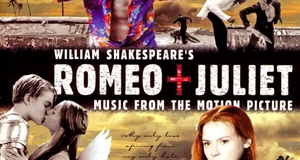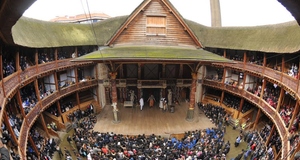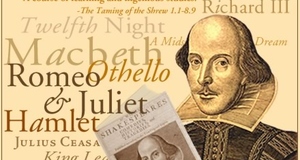The Role of News in Shakespeare's Works
By
2010, Vol. 2 No. 09 | pg. 1/1
KEYWORDS:
William Shakespeare's uses of the word “news,” and news as a source of information, are usually crucial in his works as a plot-twister. News, as used by Shakespeare, can be divided into true and false news. The word “news” does not appear in The Comedy of Errors, but the role of news plays a significant part in the comedic turns of this play. In Act I Scene II, Dromio of Ephesus was sent by Adriana to fetch Antipholus of Ephesus for dinner, and he meets Antipholus of Syracuse instead. He mistakes Antipholus of Syracuse for Antipholus of Ephesus and in turn, Antipholus of Syracuse also confuses Dromio of Ephesus for Dromio of Syracuse. Dromio of Ephesus goes on to tell Antipholus of Syracuse that his presence is wanted at home and his supposed wife, Adriana is impatient and is asking for him to go back immediately. This incident happened as the result of confusion and the sending of news to the wrong person. In Act II Scene I, Dromio of Ephesus reports to Adriana about his master's very weird behavior and because of this, Adriana becomes furious and threatens to beat Dromio of Ephesus if he does not bring her husband back. After Dromio of Ephesus leaves to get her husband, she tells her sister, Luciana that she believes that the reason behind Antipholus of Ephesus's bizarre behavior is because he is having an extra-martial affair.Luciana tells Adriana later that Antipholus of Ephesus has confessed his love to her: Call thyself sister, sweet, for I am thee: While Luciana insisted to Adriana that nothing happened between them, Adriana cursed her husband in anger, and yet, she admits to still loving her husband. The role of news in The Comedy of Errors is major, and it is frequently misleading and also confusing. This is mainly caused by the confusion between the Antipholi and the Dromios, but also because of the sequence of events: one mess led to the other. In this play, the details that were exchanged by the characters were true at first, but as the mix-up of the characters got worse, news exchanged were wrong. In The Two Gentlemen of Verona, Valentine says, Sweet Proteus, no; now let us take our leave. The word “news”, as used by Valentine, was to indicate that when he is in Milan, that Proteus should send him letters to let him know how Proteus is; about his success in love with Julia and other things along with what is happening in his life. In return, Valentine will do the same and send letters to Proteus from Milan. Proteus has received a letter from Valentine, and he is reading it when his father, Antonio walks in. Antonio: Lend me the letter; let me see what news. Antonio asks to read the letter, as he wants to see what has important things that Valentine might have written to Proteus. Proteus replies by saying that there is nothing of importance in Valentine's letter, only that he is happy in Milan and that he is loved by the Emperor. Shakespeare's manipulative play on news is evident when Proteus is telling the Duke of Milan of Valentine's plan to elope with Silvia. Proteus is trying to make himself look noble by saying that he is telling the Duke of this out of loyalty and gratitude to him, even if he is betraying his friendship with Valentine. He is exposing Valentine's intention not because of his obligations to the Duke, but rather, because he is enamored with Silvia himself. Proteus says, My gracious lord, that which I would discover In response to that, the Duke says that he has known for some time that Valentine has been seeing his daughter in her room by using a ladder, but he did not want to disgrace Valentine. Proteus then asks the Duke to intercept Valentine's plan to sneak Silvia away tonight and “But, good my lord, do it so cunningly,” (III. i. 44). He also reminds the Duke to not disclose the fact that he was the one who exposed Valentine's plan. The use of news as a transfer of information happens when as the recently banished Valentine and his servant, Speed were traveling through the forest between Milan and Mantua. Here, both Valentine and Speed run into a group of outlaws, who are banished men themselves. Valentine proceeded to recount his tale, and he has embellished his story greatly; he has apparently killed a man in a heated confrontation. The outlaws are impressed with Valentine's story and also his knowledge of many languages, forcing Valentine to be their leader. In Act I Scene II of Much Ado about Nothing, Antonio tells Leonato, “He is very happy about it. But, brother, I can tell you strange news that you yet dreamt not of” (I. ii. 4-5). The word “news” in this line means a piece of gossip, as Antonio goes on to tell Leonato that a servant of his has overheard Don Pedro telling Claudio that he is in love with Hero, Leonato's daughter and that he plans to ask for her hand in marriage at the dance tonight. Leonato refuses to believe this unless his daughter is going to be courted by Don Pedro, but he decides to inform Hero anyway and to let her make up her mind before the incident happens. The news is misinterpreted because Antonio's servant did not hear the whole conversation between the men, and only caught the very last parts of it. Borachio, Don John's servant, overheard rumors of Claudio's love for Hero and their upcoming nuptials. Don John: What news, Borachio? The same piece of information here was correctly deduced by Borachio: Don Pedro is going to seduce Hero and then hand her over to Claudio. Borachio tells Don John this, and armed with this information, he is going to try and sabotage Claudio in his romantic pursuit of Hero as he is jealous of Claudio's status. At the dance, Don John approaches Claudio and pretends to not recognize him, instead, addressing him as Benedick. He feeds Claudio with lies: Don Pedro actually wants Hero for himself, and is planning to marry her tonight. Claudio : Thus answer I in name of Benedick, Claudio believes Don John's lies, and minutes later runs out on Benedick in anger. Don John's interference with news has clearly created the chaos that he wants, albeit it was only for a moment; Claudio lears of the truth later on when Don Pedro presented him with the news of Hero's compliance to marry him.This type of manipulation also occurs in The Two Gentlemen of Verona where Proteus is telling the Duke of Valentine's plan, so that it will be foiled and Silvia will be free to be courted by him. Don John finds out in Act II Scene II that his plan to trouble Claudio has failed, and heard the news of Claudio's pending marriage to Hero: “It is so, the Count Claudio shall marry the daughter of Leonato” (II. ii. 1-2). Upon hearing this news, he wishes that he could find a way to stop the marriage. However, Borachio came up with an extensive plan for Don John to tell Claudio and Don Pedro that Hero is not a virgin. To prove it, Don John will bring Claudio and Don Pedro to Hero's balcony while him and his lover, Margaret, who is Hero's servant, make love in her bedroom disguised as Hero. While carrying out this act, Borachio and Conrade are arrested by Dogberry, the constable and his watchmen: “We charge you, in the Prince's name, stand!” (III. iii. 165). Just before the wedding the very next day, Dogberry and Verges, the Headborough, attempt to tell Leonato about the arrest of Borachio and Conrade. Dogberry says, “One word, sir. Our watch, sir, have indeed comprehended two aspicious persons, and we would have them this morning examin'd before your worship.” (IV. i. 45-48). However, they fail to convey the message, being the way they try to tell Leonato of the arrests is too complicated and long-winded. The importance of the news that Dogberry and Verger tried telling Leonato is crucial to the plot, and because the news was not received by Leonato, Don John's evil plan was never revealed in time to save Hero from the imminent humiliation that will be brought upon by Claudio. The same way in which the importance of news could potentially save a character from impending tragedy or change the plot majorly is also prominent in Romeo and Juliet. Friar Lawrence has come up with a plot for Juliet to avoid her wedding and to unite her with Romeo. He gives her a vial of medicine which, upon ingestion, will put her to sleep and make it seem like she is dead for 42 hours to others. Her wedding will then be cancelled; she will be placed in the Capulet tomb, where Romeo can wait for her and together, they can leave for Mantua. Friar Lawrence has written a letter explaining this, and asks Friar John to get this letter to Romeo as soon as possible, so that Romeo will know that Juliet's death is a hoax. However, the letter never makes it to Romeo, because Friar John has gotten stuck in a quarantined house while he was searching for Romeo. In Mantua, Balthasar, Romeo's servant tells Romeo of Juliet's death, and Romeo decides to take his own life; he buys a vial of poison from the local poor apothecary, and goes to the Capulet tomb and kills himself. When Juliet finally awakes from her “death”, she discovers that Romeo's dead body is lying in the tomb with her, and thus, she stabs herself. In these examples, crucial news never makes it to the characters in time to prevent their downfall. Hero could have been spared the humiliation, and Romeo and Juliet would have lived happily ever after. This is a way that Shakespeare uses news to shape the plots of his stories, and also to create suspense. Just as Don John and Borachio, Don Pedro also makes use of false news. Along with Claudio, Hero, Antonio and Leonato, he has devised a plan for Benedick and Beatrice to fall in love using the spread of rumors. Unbeknownst to Benedick, Don Pedro, Leonato and Claudio start talking about Beatrice's supposed love for him loudly in the garden, all the while knowing that he was wandering around the garden: Don Pedro: […] Come hither, Leonato. What was it you told me of to-day, that your niece Beatrice was in love with Signior Benedick? […] Hero does the same to Beatrice in Leonato's garden. With the help of her waiting ladies, Margaret and Ursley, they hold a conversation about Benedick's undying love for Beatrice with the intention of Beatrice overhearing this talk. Ursley: But are you sure Letters, as the medium of exchange of news are always used by Shakespeare either as a prop or a leading tool in his stories. In Romeo and Juliet, the fateful letter sent by Friar Lawrence that Romeo never obtained led him and Juliet to their demise. Valentine's plan to sneak away Silvia in The Two Gentlemen of Verona is ruined when the Duke discovers a rope ladder and a letter addressed to his daughter under Valentine's cloak. Before Proteus left for Milan and becomes infatuated with Silvia, he is in love with Julia and sends her a letter proclaiming his love; when Lucetta, Julia's maid, presents her with the letter, she refused to see it, claiming that all proper maidens should refuse such a letter. Yet, she coyly asks for the letter back from Lucetta, insisting that it would be such a waste to throw away lovely words. Somehow she falls in love with Proteus, and sends him a reply indicating her love for him. In Twelfth Night, or What You Will, Olivia falls in love with Cesario (Viola) when he is supposed to convey a speech on Duke Orsino's love for Olivia. This is mainly Cesario's job in the play: a messenger of love for Orsino. Maria also devises a plan to prank Malvolio; since she has handwriting similar to Olivia's, she writes a letter to Malvolio as Olivia, expressing her “love” for him and giving him tasks to do to show his love for her, like wearing yellow stockings and garters, “Remember who commended thy yellow stockings, and wish'd to see thee ever cross-garter'd” (III. i. 153-155). In Act I Scene II of King Lear, Edmund, the illegitimate son of the Duke of Gloucester has faked a letter from Edgar, his half-brother in an attempt to frame his brother. In the letter, Edgar has supposedly been plotting the murder of their father so that the process of inheriting his properties and power will be faster. Duke: Why so earnestly seek you to put up that letter? When asked by the Duke if the handwriting is Edgar's, Edmund answers affirmatively. The Duke then asks for Edgar's arrest. Later, when Edmund meets Edgar, he manages to convince Edgar that the Duke is angry with him and that he should be carrying a sword at all times. With this, he can also prove that Edgar is out to kill the Duke if the Duke sees him with a sword. This tactic of manipulative and fradaulent news was also used by Proteus and Don John. To go into detail of Shakespeare's extensive usage of news in his stories would be never-ending, as he is the master of tragedy; mainly with the utilization of fallacious, fabricated and shrewd news, Shakespeare manages to come up with plot twists that are probably not original, but most certainly exciting and dramatic. ReferencesShakespeare, William. The Riverside Shakespeare, Second Edition. 2nd edition. Houghton Mifflin Company, December 1996. “Concordance of Shakespeare's complete works”. 2003-2009. Dec 10 2009. George Mason University. Suggested Reading from Inquiries Journal
Inquiries Journal provides undergraduate and graduate students around the world a platform for the wide dissemination of academic work over a range of core disciplines. Representing the work of students from hundreds of institutions around the globe, Inquiries Journal's large database of academic articles is completely free. Learn more | Blog | Submit Latest in Literature |
















